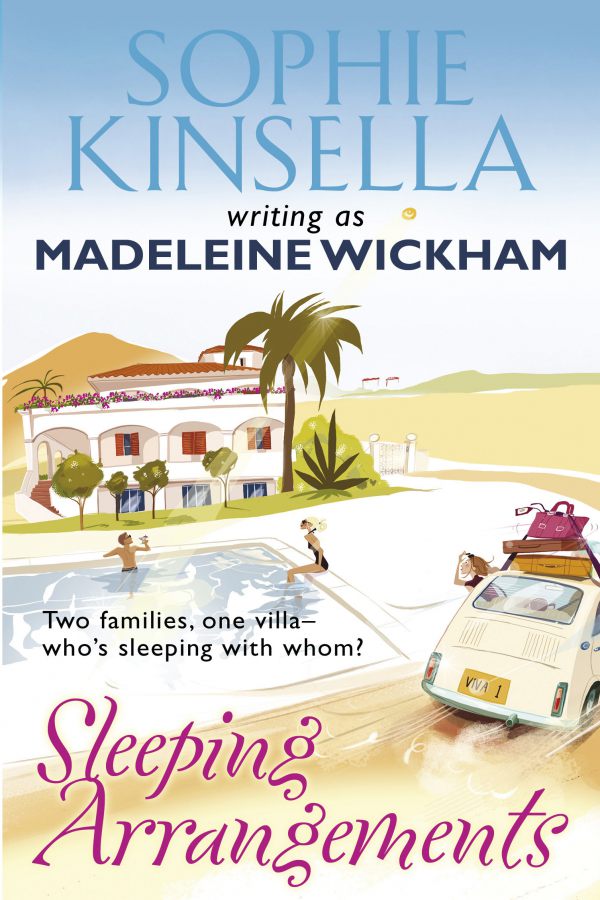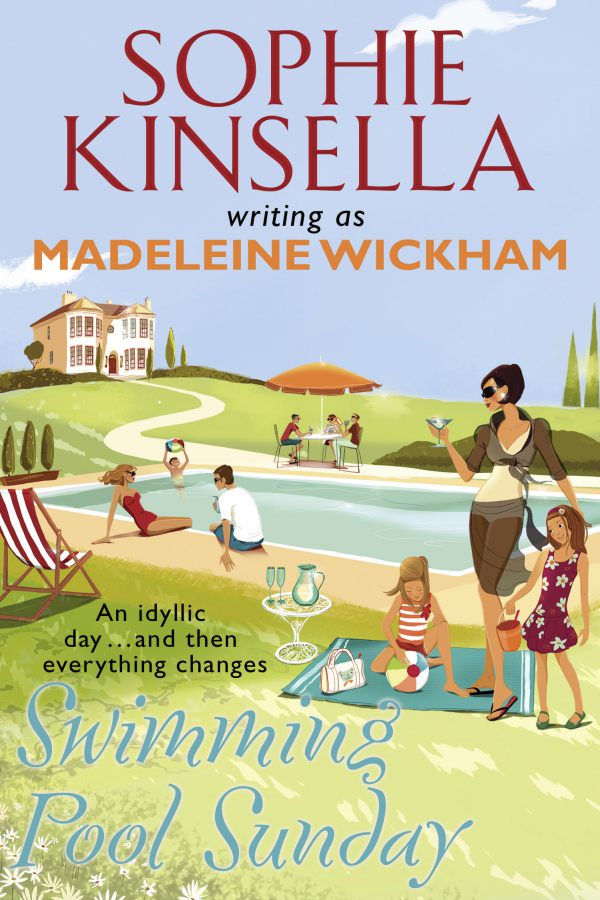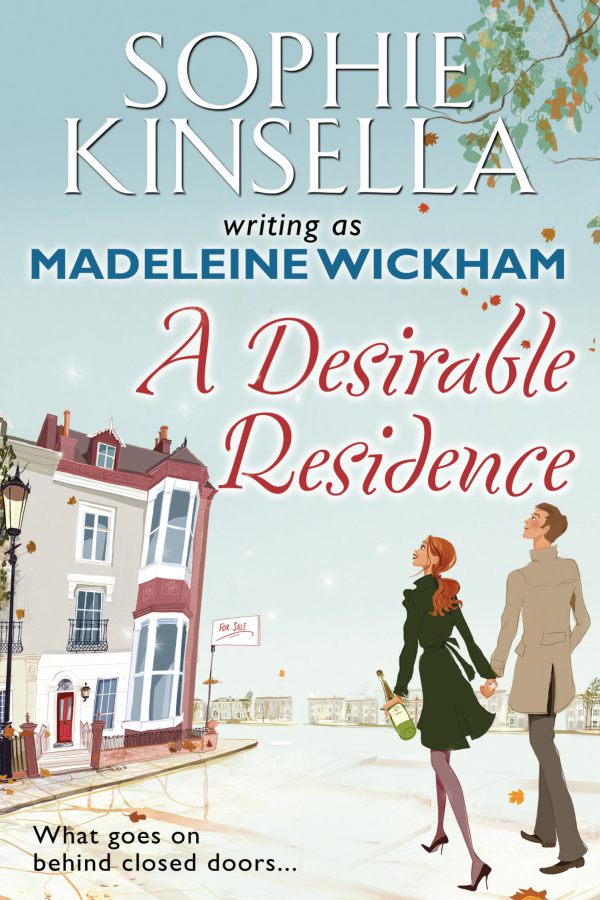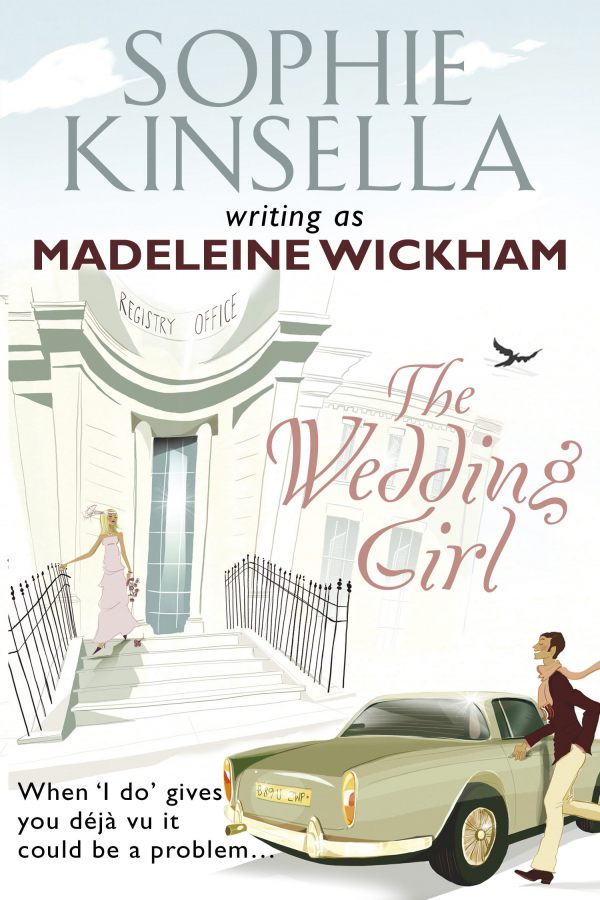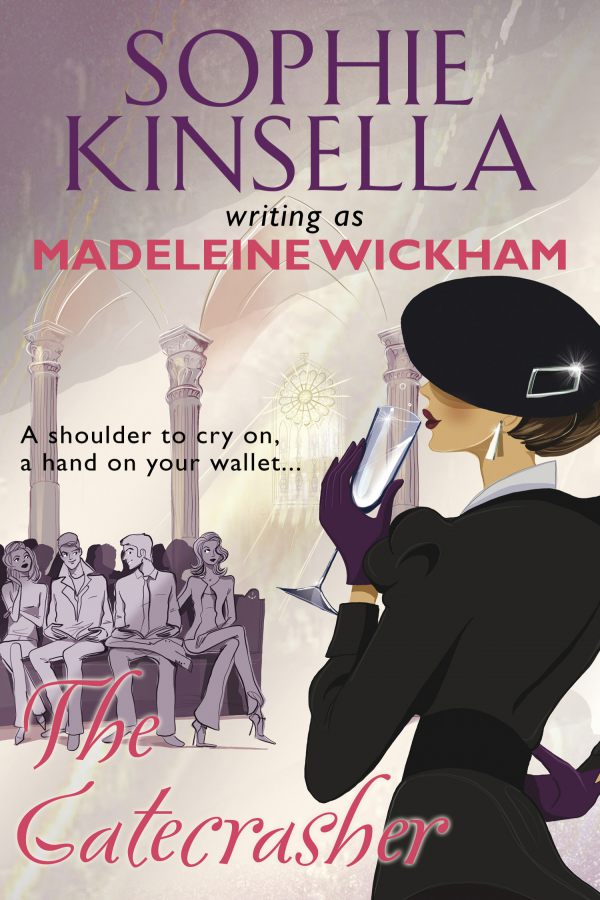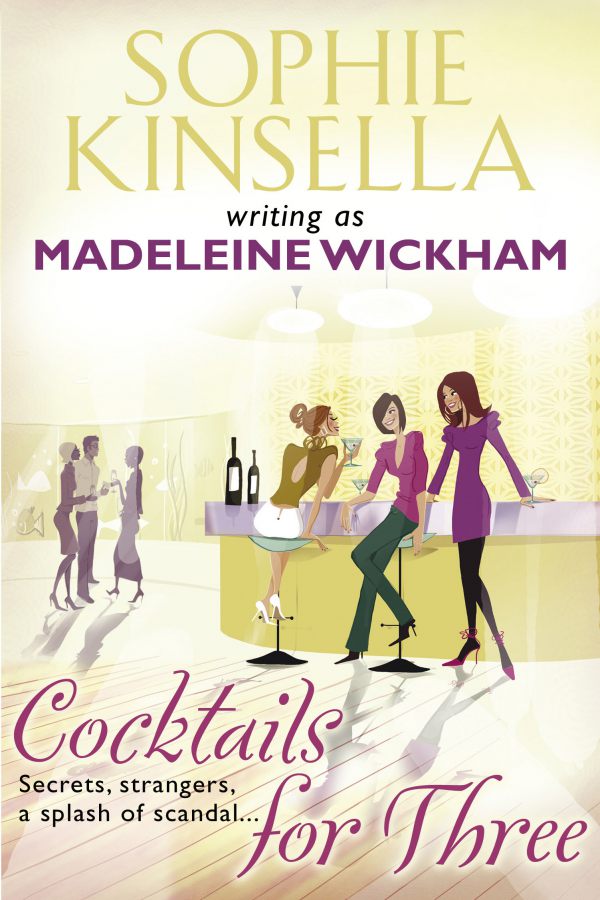
The Tennis Party / 40 Love
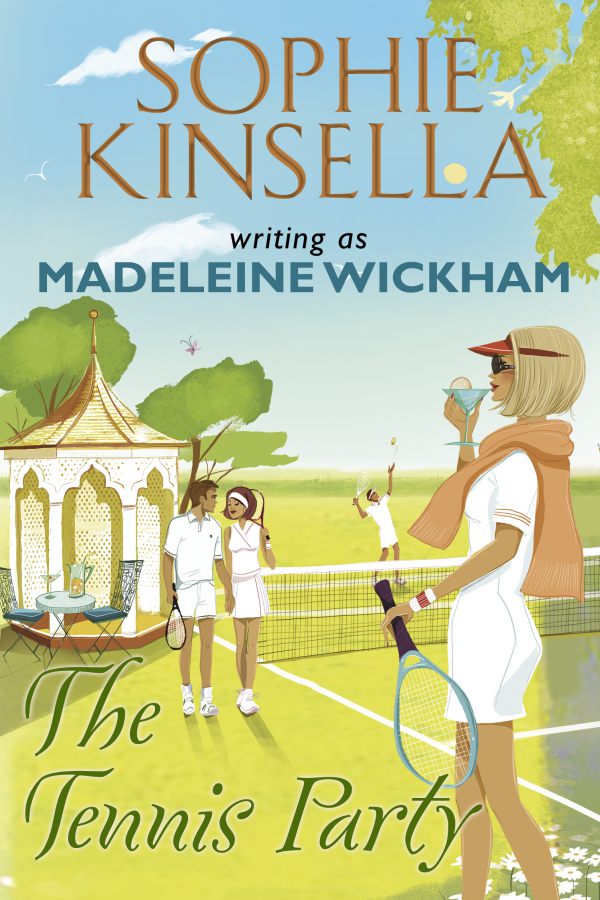
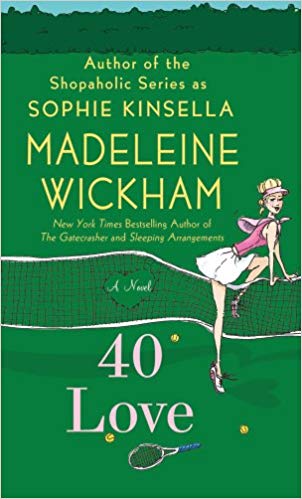
sophie’s introduction
The Tennis Party (40 Love in the US) was the first book I ever wrote. I was 24 and working as a financial journalist. I was commuting to work on the train and reading loads of paperbacks and one day I just thought to myself, ‘I want to have a go at this, I want to write a book.’ I thought and thought and tried to come up with an idea. And the idea I eventually had was a tennis party – a group of friends who come together at a country house for a weekend to play tennis – at least ostensibly to play tennis. In fact their host has an ulterior motive: he wants to extort money out of them. They all have a lot of baggage, they sleep with each other, they behave very badly, drink a lot of Pimms, thrash tennis balls around, and things come to a head quite intensely.
I can still remember the thrill of it – first of all, just getting to the end of writing it and thinking ‘I’ve written a book!’ Then, to get it published was an absolute dream come true. I can remember walking into bookshops and seeing my book up on the shelves and just staring in amazed delight. (I have no idea what the shop assistants thought of me!) I will always remember that buzz, so for me this is a very special book.
synopsis
It was Patrick’s idea that they should have the tennis party weekend. After all, he had the perfect setting – the White House. Bought out of his bonuses as an investment salesman, it was complete with stable, cocktail bar, jacuzzi, shell-shaped bedheads and, of course, the tennis court (towered over by an authentic Wimbledon-green umpire’s chair). He hadn’t actually told Caroline, his brash and beautiful wife, what the real reason for the party was. And if she suspected that he had a hidden agenda, she managed to hide it in a cloud of Pimm’s-induced laughter.
She was glad to welcome Stephen and Annie, their impoverished former neighbours, less glad to see newly wealthy Charles and his aristocratic wife Cressida, and barely able to tolerate the deadly competitive Don and Valerie. As the four couples gathered on the sunny terrace, it seemed obvious who was winning in life and who was losing. But by the end of the party, nothing would be certain. As the first ball is served over the net it signals the start of two days of tempers, shocks, revelations, the arrival of an uninvited guest, and the realisation that the weekend is about anything but tennis.
extract
It was the sort of warm, scented evening that Caroline Chance associated with holidays in Greece; with glasses of ouzo and flirtatious waiters and the feel of cool cotton against burnt shoulder. Except that the sweet smell wafting through the air was not olive groves, but freshly mown English grass. And the sound in the distance was not the sea, but Georgina’s riding instructor, intoning – always with the same monotonous inflection – ‘Trot on. Trot on.’
Caroline grimaced and resumed painting her toenails. She didn’t object to her daughter’s passion for riding – but neither did she comprehend it. The moment they had moved to Bindon from Seymour Road, Georgina had started clamouring for a pony. And, of course, Patrick had insisted she should be given one.
In fact, Caroline had grown quite fond of the first pony. It was a sweet little thing, with a shaggy mane and a docile manner. Caroline had sometimes gone to look at it when no-one was about and had taken to feeding it Ferroro Rocher chocolate. But this latest creature was a monster – a huge great black thing that looked quite wild. At eleven, Georgina was tall and strong, but Caroline couldn#t understand how she could even get onto the thing, let alone ride it and go over jumps.
She finished painting her right foot and took a slug of white wine. Her left foot was dry, and she lifted it up to admire the pearly colour in the evening light. She was sitting on the wide terrace outside the main drawing-room of the house. The White House had been built – rather stupidly, Caroline felt, given the English climate – as a suntrap. The stark white walls reflected the sun into the central courtyard , and the main rooms faced south. A vine bearing rather bitter grapes had been persuaded to creep along the wall above Caroline’s head; and several exotic plants were brought out of the greenhouse every summer to adorn the terrace. But it was still bloody freezing in England. There wasn’t much they could do about that.
Today, though. She had to concede, had been about as perfect as ot cpi;d get. Translucent blue sky; scorching sun; not a gust of wind. She had spent most of the day getting ready for tomorrow, but luckily the tasks she had allotted herself – arranging flowers, preparing vegetables, waxing her legs – were the sort of thing that could be done outside. The main dishes – vegetable terrine for lunch; seafood tartlets for dinner – had arrived from the caterers that morning, and Mrs Finch had already decanted them onto serving plates. She had raised an eyebrow – couldn’t you even bring yourself to cook for eight people? – but Caroline was used to Mrs Finch’s upwardly mobile eyebrows and ignored them. For Christ’s sake, she thought, pouting herself another glass of wine, what was the point of having money and not spending it?
The riding lesson was over and Georgina came bounding across the lawn, long blond rivers of recently plaited hair streaming down her back.
‘Mummy,’ she called, ‘Dawn said my rising trot was more controlled that it’s ever been! She said if I ride like that in the East Silchester gymkhana…’ She looked impressively at Caroline. Then what? thought Caroline. Then you’ll win? Then you’d better give up? She had no idea whether a rising trot was supposed to the controlled or utterly abandoned. ‘And my jumping’s getting better,’ added Georgina.
‘Oh good, darling,’ said Caroline. Her voice was husky, roughened by cigarettes and, lately, a bottle of white wine nearly every evening.
‘Nail varnish,’ said Georgina. ‘Can I put some on?’
‘Not on those filthy nails,’ said Caroline. ‘You need a bath.’
‘Can I when I’ve had my bath?’
‘Maybe. If I have time.’
‘I want bright pink.’
‘I haven’t got any bright pink,’ said Caroline, wrinkling her nose. ‘You can have a pretty paly pink or red.’
‘Red, urggh.’ Georgina pulled a face. Then she jumped up onto the terrace and swung on the back of Caroline’s beechwood chair. ‘Who’s coming tomorrow?’
‘You know who’s coming,’ said Caroline, carefully applying a second coat to her left foot.
‘Nicola’s coming, isn’t she?’
‘Mmm.’
‘Is she better yet?’
‘Getting better.’
‘Shall I take her riding? Is she allowed?’
‘You’ll have to ask Annie. I don’t see why not. But make sure you take Toby, too.’
‘He’s too little to go on Arabia.’
‘All right, then, he can watch.’
‘Can I be in the tennis tournament?’
‘No.’
‘Can I wear my tennis skirt?’
‘If you want to.’
‘Can I be ballgirl?’
‘You can if you want,’ said Caroline, ‘but you’ll get bored.’
‘No I won’t,’ said Georgina. ‘I know how to do it. You roll the balls along the line and then you hold them up and throw them to the people playing. Poppy Wharton’s cousin was a ballgirl in Wimbledon, and she saw Navratilova. I can serve overhead, too.’
She threw up an imaginary ball and took a swipe at it, bumping into Caroline’s chair as she did so. The nail varnish brush smudged.
‘Fuck,’ said Caroline without rancour.
‘No-one’s going to see your feet, anyway,’ said Georgina. ‘Will you put some on my fingers?’
‘After your bath. You need clean nails. Yours are all horsy.’ But Georgina had lost interest and was doing a handspring on the lawn. Caroline, who had once trained as a gymnast herself, looked up. They didn’t teach them to finish off properly any more, she though; to land neatly and present to the judges with a pretty smile. At Georgina’s boarding-school, no-one took gymnastics seriously. They did it to strengthen the girls for more important pursuits – netball, lacrosse, and always the horses. None of them seemed interested in competition, show routines, shiny leotards and ribbons – the stuff of which Caroline’s childhood had been made.
***
Patrick Chance, walking up to the house from the tennis court, saw his beautiful, agile daughter turning cartwheels against the setting sun, and stopped for a moment, taking in her effortless grace, her vitality and energy. Was every father as sentimental as he? He found it difficult, talking to other parents, to emulate their easy nonchalance. Whereas they shrugged off their children’s achievements, he could not resist cataloguing Georgina’s; could never resist breaking off in conversation to point out that his daughter had just gone into the ring, yes, competing in the under fourteens, even though she was only just eleven. When the other parents nodded, smiling, and turned back to their chatter, his heart would beat with suppressed rage and incomprehension. But look at her! he always wanted to cry. Just look at her! She plays the piano, too, he would say, desperate to win back their attention. Coming on very well, her teacher says. We thought we might try her on the flute.
Caroline, he noticed, had turned her attention back to her nail polish. It still pained him that she didn’t share his fervent appreciation of Georgina – and refused to join in when he began to eulogize about her, even when they were together on their own. Particularly because, to be fair, there was a lot more in Georgina that Caroline could claim as her own that he could. Mother and daughter shared their blond hair, their athletic frames, their tendency to burst into raucous laughter. But perhaps that was why Caroline was so blasé about Georgina. She was used to beauty, physical accomplishment and popularity. Whereas Patrick, short, stumpy and short-sighted, was not.
He continued walking towards the house and Georgina started walking towards him in a crab.
‘Hello, Daddy,’ she panted, and collapsed on the ground.
‘Hello, kitten,’ he said. ‘Good riding lesson?’
‘Brilliant.’ He looked up at Caroline.
‘Everything under control for tomorrow?’
‘The food’s on the plates, if that’s what you mean,’ said Caroline. ‘And Mrs Finch went over the bedrooms this morning.’
‘Who’se next door to me?’ demanded Georgina.
‘The little Mobyn twins and that nanny girl. What’s her name?’
‘Martina I think,’ said Patrick. ‘She’s German. Or Austrian, or something.’ Georgina wrinkled her nose.
‘Why couldn’t it be Nicola and Toby?’
‘Ask Daddy,’ said Caroline acerbically. ‘He insisted that Charles and Cressida go in the big spare room, so the twins have to in the one next to you. Cressida,’ she enunciated the word with deliberate care, ‘likes having them near by.’
‘Why couldn’t they all go down the passage?’ suggested Georgina. ‘And Annie and Stephen go in the big spare room and Nicola and Toby next to me?’
‘Daddy wants Charles and Cressida to have the big room,’ said Caroline,’ because they’re very rich, and he doesn’t want them to sneer at us.’ Patrick flushed.
‘Now that’s not true at all. I just thought it would be nice for them to have that room. Since they haven’t been here before.’
‘They probably never will be here, either,’ said Caroline briskly. ‘What’s the betting they phone and cancel tomorrow morning?’
Caroline raised suspicious eyes. ‘Why the hell not? That’s what they usually do. How long have we been here? Nearly three years. And they’ve always been too busy to make it to anything.’
‘Cressida is a shithead,’ said Georgina. Caroline gave a cackle of laughter. Patrick stared at Georgina.
‘Where on earth did you learn language like that?’
‘Don’t be so boring,’ said Caroline. ‘Why do you think Cressidas a shithead, sweetie? You hardly know her.’
‘I liked Ella,’ said Georgina mulishly.
‘You can’t possibly remember Ella,’ said Caroline.
‘I do,’ said Georgina. ‘She was really nice, she used to sing me songs. And Charles used to play the guitar.’ Patrick looked admiringly at her.
‘What a memory! You must have been only about six then.’
‘I liked Seymour Road,’ said Georgina simply. ‘I wish we still lived there.’ Caroline gave another cackle of laughter.
‘There you are, Patrick, so much for the country life!’ Her blue eyes held his mockingly for a moment, and he stared back with an impotent rage. Her eyes seemed to reflect his own failures and worries back at him, reminding him in a tacit instant of the disappointments and disillusionments of the last thirteen years.
‘I must go and draw up the chart for tomorrw,’ he said abruptly. For Georgina’s sake more than his own he walked onto the terrace and kissed his wife on the mouth. She tasted, as she had done when he first kissed her behind one of the stand at the Daily Telegraph personal finance exhibition, of lipstick, cigarettes and alcohol.
‘I’ll be eigth seed if you like,’ she said, when his head came up again. ‘I don’t rate myself very highly at tennis.’
‘It’s doubles,’ he said, irritation rising.
‘Mixed doubles,’ said Georgina, who was once again in a crab position. ‘I could play with Toby, and Nicola could play with one of the twins. And the other twin could play with the nanny. How about that, Daddy?’
But he had gone.
As Patrick entered his study, he felt rather deflated. Caroline’s last dig about the country life had touched an unexpected sore spot. Life at Bindon had not turned out quite as he had wanted, and he, too, often felt a secret nostalgia for the days at Seymour Road. He had decided that they should move into the country really for Georgina’s sake. All the smart little girls that he met at her school seemed to live in villages, in old rectories and farmhouses, with dogs and horses and sheep. None of them lived in red-brick villas in the suburbs of Silchester.
So they had sold twenty-four Seymour Road, moved to Bindon and bought Georgina a pony. Here, Patrick had felt, they would move into a new level of existence. His mind had been filled, in the few weeks before the move, with images of large houses with sweeping drives, aristocratic girls leading horses out of loose boxes, croquet on the lawn, young boys called Henry and Hugo for Georgina to grow up with.
But Bindon wasn’t like that. Hardly any of the families living in the village were what Patrick though of as ‘country’. Many had moved to Bindon out of Silchester, or even London, attracted by the quick rail link to Waterloo. They made Patrick shudder, with their whining London voices, so different from Georgina’s clipped schoolgirl tones. Besides, they tended to keep to themselves, relying for their social life on parties of friends down from London – and, when those dried up, often moving back to London themselves. The previous owners of The White House had sold to move back to Battersea, bored with a village life that they hadn’t even tried.
For there was a village community of sorts in Bindon. Patrick and Caroline attended church every other Sunday, patronized the village fête, and were on amiable terms with the farmer whose land bordered their own. They knew the old lady whose family had once owned the manor house – and who now lived in a nearby cottage. They knew the fluttery pair of sisters whose brother had been the vicar of Bindon before he died. They knew the rather eccentric Taylors, who had lived in Bindon for generations – and probably married each other for generations, Caroline liked to add. But nowhere had Patrick found the smart, sociable, double-barrelled, Country Life families for which he was looking.
The trouble with Silchester, he had heard another parent at Georgina’s school saying, was that it had turned into another London suburb – full of bloody commuters. Patrick, who himself comuted to London, was not offended by this remark. He knew he wasn’t the proper thing – neither was Caroline. But Georgina could and would be, if only she could mix with the right people. He was now looking seriously at moving further into the country – Dorset, Wiltshire, Somerset, perhaps. He had visions of a big Georgian house; perhaps ten or twenty acres. If this year went well, perhaps they could start looking.
If this year went well.
Patrick’s eye fell on his desk; on the paperwork he’d prepared for tomorrow. He would ask Charles casually into the study after lunch. No hassle, just an agreeable piece of business between friends. Besides, hassling wasn’t Patrick’s style. Never had been. Even when he’d been a cold-call salesman, he’d always retreated gracefully at the first sign of annoyance, playing it cool and courteous. Always courteous. Sometimes they were intrigued; sometimes he even found the punter phoning him back. When he sensed he’d got their interest, he would sometimes switch on the intimate, enthusiastic, I’m-doing-this-for-you-as-a-friend routine. But not if they were sophisticated investors – or, most tricky of all, thought they were sophisticated. Then it would be the smooth, I’m-not-going-to-insult-your-intelligence approach. Selling’s all about judging the client, he though. There’s a way into anyone’s pocket.
He sat down, put the folder marked ‘Charles’ to one side, and began carefully drawing out the chart for the tournament. But a doubt kept swimming around in his mind. Charles and Cressida had always managed to cancel when they’d been invited to Bindon before – an ill child; are calcitrant nanny; once, less believably, two cars that wouldn’t start. And although he’d got Charles’ absolute assurance that they would be attending the party tomorrow, the very thought that they might somehow pull out caused distress signals to go shooting down Patricks’ spine. If they didn’t meet tomorrow, there would probably be no chance of seeing Charles for several months.
He sat back in his chair, staring blindly at the bookcase. Was it worth phoning Charles and Cressida to check that they were coming? He rehearsed the call in his mind. A relaxed, unpressured tone of voice – ‘Charles, old boy, don’t tell us you’re going to blow us out again. Caroline will never forgive you.’ Or, if he got Cressida, some domestic query that would please her – ‘Just checking that the twins aren’t allergic to goose-down quilts.’ He reached for his Filofax and dially the number, fingers trembling slightly.
‘Allo?’
Shit. The German nanny. But perhaps Charles was there.
‘Hello there, could I speak to Mr Mobyn?’
‘He isn’t here, I am sorry, is there a message please?’
Fuck.
‘It’s Patrick Chance here, just checking that you’re all coming to the tennis party tomorrow?’
‘Tennis party.’ The girl sounded doubtful. Patrick held his breath. ‘Yes, I think we leave here at ten o’clock.’
‘Good, good.’ Patrick tried not to sound too elated.
‘What is the message please?’
‘Oh, erm, no message,’ said Patrick. ‘Just checking you were all still coming.’
‘Shall I ask Mr Mobyn to call you back?’
‘Yes. Look, it really doesn’t matter,’ said Patrick. ‘I’ll see you all tomorrow, all right?’
‘Is that the messae?’
‘Yes, all right.’ Patrick gave in.
He replaced the receiver and closed his eyes. By this time tomorrow it should all be in the bag; signed, seal and stamped. He picked up the folder and flicked through it a couple of times. But he was already completely familiar with its contents. He put it into his top drawer, closed and locked it. Then he spread out the sheet for the tournament chart and began to write the names of the four pairs across the top. Patrick and Caroline, he wrote. Stephen and Annie. Don and Valerie. Charles and Cressida.
Charles and Cressida Mobyn were attending a drinks party at the house of Sir Benjamin Sutcliffe, before a charity performance of the Messiah in Silchester Cathedral. They mingled, holding glasses of Kir Royale, with the most eminent residents of Silchester – many of whom lives, like they did, in the Cathedral Close – together with a sprinkling of celebrities from around the area and eve na few from London. Sir Benjamin’s drawing room was long and high ceilinged, with enormous unshuttered windows looking directly onto the floodlit cathedral, and most of the guests were turned unconsciously towards the view, looking up every so often as though the check it was still there.
Cressida was one of the few guests present with her back towards the cathedral. Tall, elegant and queenly, she seemed oblivious of its towering presence; even though she was universally acknowledged as one of the most tireless campaigners for the West Tower Fund. Indeed, her name was listed on the back of tonight’s concert programme as one of the hardworking committee members who had made it all possible.
She was talking now to the well-loved radio presenter who would be making a speech at the beginning of the concert. The radio presenter was gesturing flamboyantly at the splendid sight of the cathedral, and Cressida, looking slightly taken aback, turned to look at it. Almost immediately, she turned back and smiled politely at the presenter. She had, after all, seen the cathedral nearly every day for the last for years. She did, after all, live opposite it.
Charles, watching her from the other side of the room could follow her thoughts as easily as his own. After all this time, the combination of her blinkered mind, her rangy blonde beauty and her wealth still acted on him like an aphrodisiac. When Cressida, at the breakfast table, looked up from the newspaper and asked in all innocence what they meant by privatization – or what on earth was wrong with insider dealing – he invariably felt an immediate surge of sexual energy. When she opened letters from her portfolio managers, frowned in slight puzzlement, and threw them down beside her plate, he didn’t know whether to laugh or cry. Contrary to popular belief, he hadn’t married Cressida for her money. He had married her for her complete indifference to it.
The only child of a successful toy manufacturer, Cressida had been raised by her aristocratic mother to live on a stream of chequebooks, shop accounts and credit cards – all to be paid off by Daddy. Even now, she invariably carried little cash. Her portfolio of investments, managed by a blue-blooded investment management firm in London, kept a steady flow of income into her Coutts account, and it was now Charles, not Daddy, who undertook the monthly reckoning up of bills.
The portfolio had diminished rather sharply in size over the last three years. A large chunk had gone on the house in the Cathedral Close, and another on buying out Angus, his former busimess partner. Charles was now the sole proprietor of the Silchester Print Centre, part gallery, part shop, dealing in prints of all descriptions. When he, Angus and Ella had run the Centre together, it had been different. They had put on lots of exhibitions of new young artists; had held printing workshops; had sponsored an annual print competition at the local technical and arts college. Now, running it more or less on his own, and engrossed with Cressida and the twins, Charles found himself veering towards the safer, more predictable end of the market. Old prints of Silchester Cathedral; prints of watercolours by Sargent; even posters of Van Gogh’s Sunflowers. He defended this path to himself on financial grounds: the figures weren’t as good as they had been; it was time to stop throwing money around on experimental projects and consolidate. When a small voice in his brain pointed out that the figures had only got worse after he’d given up on all the experimental projects, he ignored it.
He didn’t regret leaving Ella. Occasionally he felt momentary stirrings of nostalgia for their cosy existence together in Seymour Road. But that hadn’t been real life. This, mingling with important people in an important house in the Close, was real life. Discussing schools for the twins, instructing Coutts to open bank accounts for them, was real life. Being asked, as he had been today, to be godfather to the Hon. Sebastian Fairfax – that was real life.
Homely, red-brick Seymour Road had simply been a preparation for the real world. He remembered it fondly and still held affection for it – but it was the same affection he felt for his childhood rocking-horse when he outgrew it. As for Ella, he hardly ever gave her a thought.
The lights were on at eighteen Seymour Road when Stephen Fairweather pushed his bike through the gate and padlocked it to the fence. The overgrown front garden smelt of fresh evening air and honeysuckle; as he pushed open the front door, this was combined with the aroma of frying mushrooms.
Downstairs, in the cosy basement kitchen, Annie was making mushroom omelette while Nicola sat at the kitchen table, carefully colouring in a map of Africa. Stephen stood at the door watching her for a moment. His heart contracted as he saw her clenching the pen, controlling the movements of her arm as best she could and frowning with impatience when as sudden jerk sent the green colour shooting outside the black outline of the map.
Colouring was good for her co-ordination, Nicola’s physiotherapist said. Anything that used the damaged right side of her body should be encouraged. So the kitchen table was permanently heaped with colouring-books, beanbags for throwing and catching, skipping-ropes, crayons, cutting-out scissors, spillikins, rubber ring, rubber balls, jigsaws. Next to her map of Africa, Stephen saw Nicola’s holiday project folder. ‘Africa is a continent, not a country,’ he read. ‘Zambia and Zimbabwe are in Africa. The weather is very hot and there is not very much water. Sometimes the people starve.’ Nicola had just been starting to learn to write when she had had the stroke. Now her writing was spidery, with ill-formed letters ground hard into the page. He could read frustration in every jagged line.
She looked up then, and her thick spectacles gleamed with pleasure.
‘Hello, Daddy!’ Annie looked up from the frying-pan.
‘Stephen! I didn’t hear you come in!’ He crossed the kitchen, ruffling Nicola’s hair on the way, and gave Annie a kiss. Her cheeks were bright red from the heat and her dark hair had curled into tendrils around her face. ‘Did you have a good day?’ she asked.
Stephen closed his eyes and briefly reviewed the last twelve hours. An early train journey into London; an hour’s wait at the department to see his supervisor for fifteen minutes; a sandwich at the British Library while waiting for the documents he’d requested; a few hours’ good work; a late appearance at a seminar he’d promised to attend; back onto the train and home… He opened his eyes again.
‘Yes, not too bad,’ he said.
Stephen was scheduled to finish his Ph.D. the next summer. At the rate he was going, it might just be possible – but still the thought of marshalling his assorted notes, ideas and theories into a coherent, substantial thesis filled him with a blank dread. Information that had seemed solid enough when he put together his thesis proposal, arguments that had seemed weighty and convincing, now seemed to have become gossamer then, floating out of the grasp of his mind whenever he attempted to formulate them in his introduction.
At the department, at seminars, even at home with Annie, he remained outwardly confident, assuming with a worrying ease the veneer of someone who knows he is going to succeed. He never articulated his secret fear – that he simply wasn’t up to the rigours of such an ambitious project; that he should have stayed as he was: a humble schoolmaster with no pretensions to changing the face of fourteenth-century musical history.
He opened the fridge and cracked open a beer.
‘Did I say I had a good day?’ he said humorously. ‘I must be mad. Mark wasn’t free to see me when he’d said he would be, my papers took forever to arrive, and I was coerced into going to the mad Bulgarian woman’s seminar.’ Nicola giggled.
‘Is she really mad?’
‘Barking,’ said Stephen solemnly. ‘She entertained us for an house with her views on the music that is all around us in nature.’
‘Birds singing,’ suggested Nicola.
‘If only,’ said Stephen. ‘No, she was talking about trees, and snails’ shells, and other completely soundless creatures.’
‘Definitely mad,’ said Annie. Stephen took a swig of beer.
‘And did you all have a good day?’ He looked around. ‘Is Toby in bed?’ Annie grinned.
‘Yes, we wore him out with a walk on the downs. We took a picnic up there. It’s been such wonderful weather.’
‘And then we got everyone’s clothes ready for tomorrow,’ said Nicola. Stephen looked puzzled.
‘What’s tomorrow?’
‘The tennis party, of course,’ said Nicola in tones of amazement. ‘You must know about that!’
‘He does know,’ said Annie. ‘He’s just pretending he’s forgotten.’ Stephen shook his head.
‘No, this time I didn’t have to pretend. It really had gone straight out of my head.’
‘Good thing Mummy remembered,’ said Nicola,’ all our things needed washing.’ Stephen grimaced.
‘I didn’t know I had any “things”.’
‘Old white shorts and an artex,’ said Annie briskly. ‘And your racquet’s just about OK. A string’s missing…’
‘But someone with my talent doesn’t need the equipment,’ said Stephen. ‘I know. What about you?’
‘Well actually,’ said Annie, blushing slightly, ‘Caroline very kindly said I could borrow some of her things. I think she realized…’ She tailed off and her dark eyes met Stephen’s green ones. For a moment, he felt a flash of anger. He knew Caroline’s sympathetic, slightly too-loud remarks; her appraising looks; her complete incomprehension as to why anyone would chuck in a perfectly good teaching job to do more studying, for Christ’s sake. He would be aware of her no doubt kindly gesture all day. But to say any of that to Annie would be unforgivable.
‘Very good of her,’ he said lightly. ‘Pity Patrick’s such a far bugger. Otherwise I could have swanned around in his Lacoste. Perhaps I will anyway.’ And, hoisting his rucksack onto his back, he went out of the kitchen and up the stairs to put away his books.
audio extract
goodreads reviews
media reviews
"It's exactly the sort of bright, hilarious novel you want to read while flopping on a sun-lounger with a chilled spritzer to hand."
Daily Mail
"Sharply observed first novel...light but lethal."
Mail on Sunday


